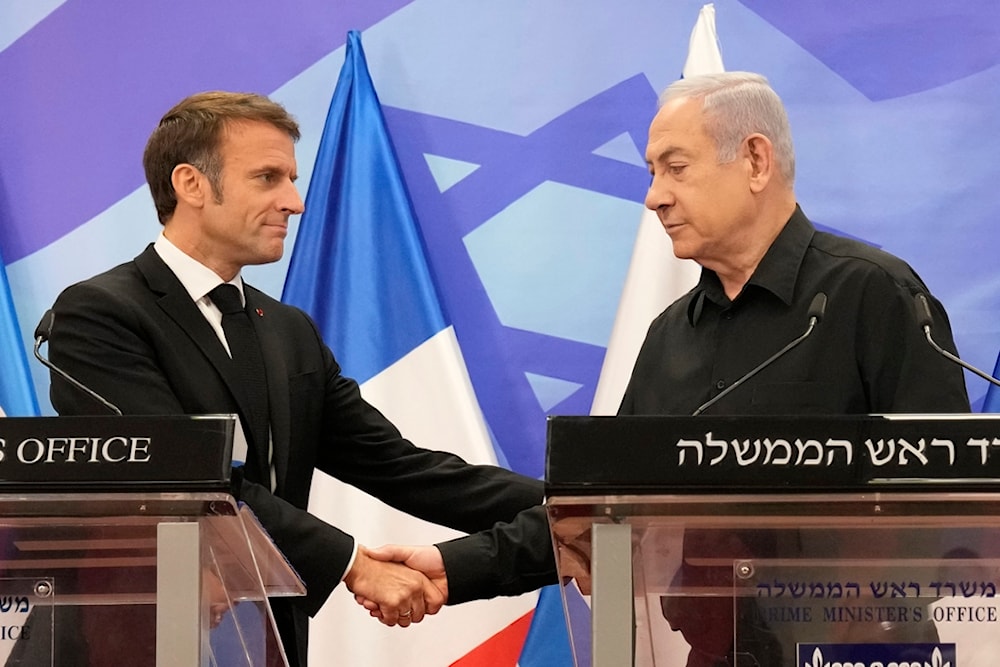France dismisses ICC arrest warrants for Lebanon truce contribution
France says it would not arrest Netanyahu and Gallant on its soil in return for active participation in overlooking the application of Resolution 1701 between Lebanon and "Israel".
-

Israeli Prime Minister Benjamin Netanyahu, right, shakes hands with French President Emmanuel Macron during a joint press conference in occupied al-Quds, Oct. 24, 2023 (AP)
In an unprecedented move, France backtracked on its commitments to the International Criminal Court and announced that it would not detain Israeli Prime Minister Benjamin Netanyahu and former Security Minister Yoav Gallant despite the warrants that were issued for their arrests.
France decided to retain the Israeli officials' freedom on its lands, citing "historically cordial relations" that linked it to "Israel", as well as the occupation and its own "respect for professional and independent justice, and the integrity of the law."
In a statement, the French Foreign Ministry further claimed that while it is committed to international justice, its decision stems from the rules of impunity provided for officials whose "states are not a party to the ICC."
"A state cannot be held to act in a way that is incompatible with its obligations in terms of international law with regards to immunities granted to states which are not party to the ICC," the statement read.
Anadolu Agency, citing a report by RMC radio, stated that Netanyahu demanded that France refrain from enforcing the ICC's decision during a phone call with French President Emmanuel Macron.
Although Macron has not issued an official statement on the issue, multiple sources cited by RMC indicate that he informed Netanyahu that France would adhere to international law and noted that judges have the authority to grant them immunity.
Macron succumbs to Netanyahu's demands
Sources, however, revealed to Al Mayadeen that France's decision came as a compromise to an Israeli demand amid the ceasefire with Lebanon.
After Macron condemned the Israeli ground offensive in Lebanon, "Israel" rejected France's participation in the committee overlooking and ensuring the application of Resolution 1701 between Lebanon and the Israeli occupation regime.
"Israel's" refusal lasted up until 48 hours before the ceasefire was announced, until Netanyahu informed Macron of his condition regarding the court's decision during their phone call last week. Al Mayadeen's sources confirmed that Macron agreed to the decision without referring to his Prime Minister, Michel Barnier.
Barnier had confirmed France's commitment to the decisions and requirements of the ICC during a governmental meeting, affirming that the nation would comply with the arrest warrants and would not question the court's ruling, only 24 hours after the call was made, proving that he was unaware of any approval of "Israel's" demands.
How France's submission discredits its legal facade
France, through its legally unjustified decision, has positioned itself in opposition to international laws. According to the Rome Statute, which established the International Criminal Court, member states are obligated to enforce the court's decisions, even when they pertain to individuals from non-member states. Article 89, Paragraph 1, states: "The States Parties shall comply with requests for arrest and surrender in accordance with the provisions of this Part and with the procedures under their national law."
The Rome Statute also highlights the clear responsibility of states in cases where an arrest warrant is not executed—in this case, France. Article 87, Paragraph 7, of the Rome Statute specifies: "Where a State Party fails to comply with a request to cooperate by the Court contrary to the provisions of this Statute, thereby preventing the Court from exercising its functions and powers under this Statute, the Court may make a finding to that effect and refer the matter to the Assembly of States Parties or to the United Nations Security Council."
Consequently, France's refusal to enforce the ICC's decision places international legal institutions in an extremely complicated position. France's justifications hold no legal value, particularly since this situation mirrors the case with Russia. ICC spokesperson Fadi El-Abdallah had previously clarified the matter when addressing the Russian case, stating decisively "The decision is binding despite Russia's (or, in this case, Israel's) non-membership in the Rome Statute."
France has thereby thrown a fireball that will have repercussions on the national level and is expected to provoke reactions from French political parties, human rights organizations, and legal authorities rejecting this step. Worse still, it undermines international justice, with Paris, once a self-proclaimed historical advocate for international institutions, justice, accountability, and the prosecution of war criminals, now jeopardizing its own credibility.
Read more: ICC warrants are binding, EU cannot pick and choose: Borrell

 4 Min Read
4 Min Read








